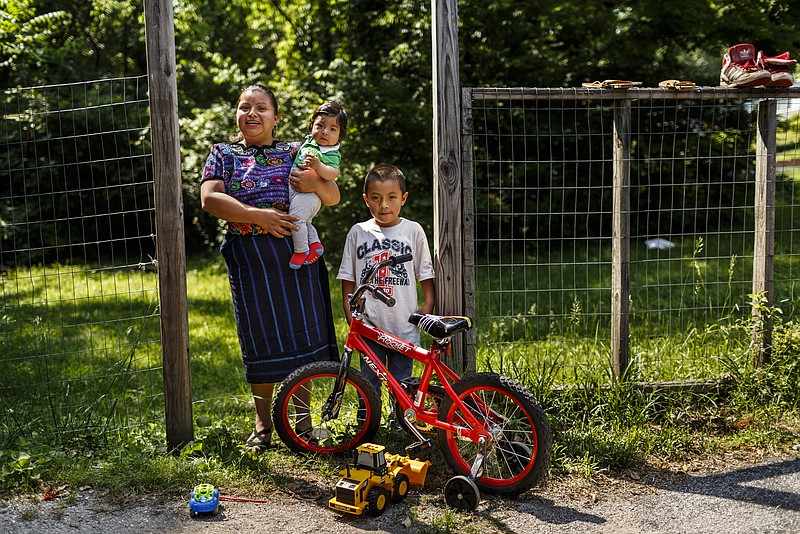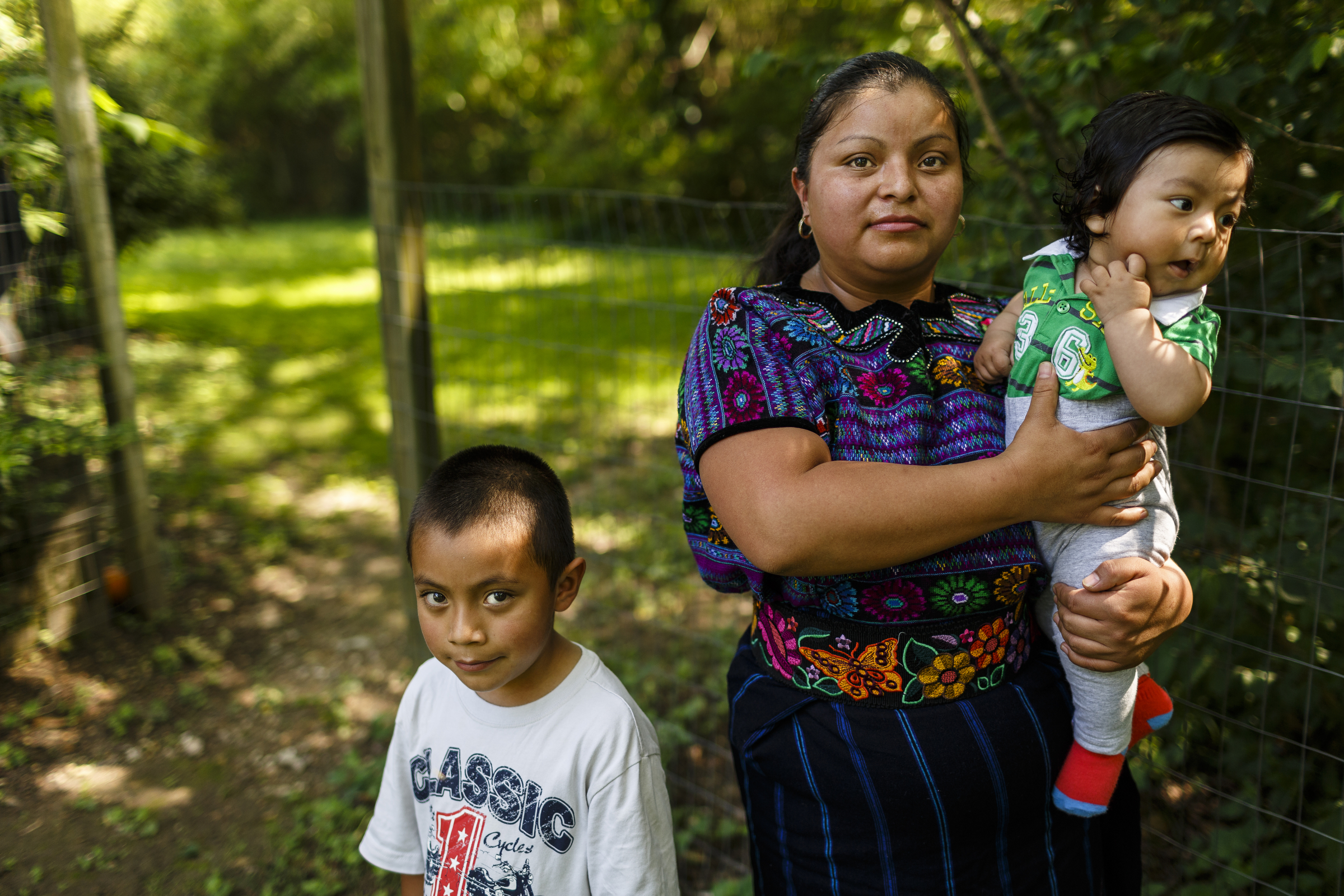Basilia didn't intend to make Chattanooga her home, but staying in Guatemala might have cost her her life.
Her husband came to the United States in 2011 for a job. He wanted to earn enough money to purchase a home in Guatemala for Basilia and their baby.
In Guatemala, he worked on a farm for food, then sold the food for money. Sometimes he earned $10 a day.
In the United States, he earned $10 an hour. He would keep enough to pay living expenses and send whatever remained, $100 to $200 every two weeks, to Basilia.
The problem started about three years after her husband left, about a year after she moved out of her mother-in-law's home, a cramped three-bedroom cottage housing nine adults and their children. Using money her husband sent, she found her own place and began paying rent.
Guatemalan gang members noticed the then-24-year-old mom living alone with her young son. They watched her leave on her two-hour walks from her farm to the city for the money her husband sent.
When they learned her routine, they confronted her. They beat her, more than once, and took her money. She filed police reports, but no one was captured.
The last time they came for her, six gang members beat her until they thought she was dead. Basilia is 4-foot-10 and weighs 100 pounds. During this beating, her body went limp and she passed out. She woke with a permanent scar down the middle of her forehead. She can't remember if it was a fist, a foot or a weapon that marked her. But that raid set the shy and soft-spoken mother's resolve to leave her country.
Journeys North
Basilia isn't alone. About 77,700 Central American migrants traveling in family groups were detained on the southwestern American border in fiscal year 2016. More than 90 percent of them were from El Salvador, Honduras and Guatemala, a region known as the North Triangle that is plagued by gang violence, according to an article published in The New York Times on Nov. 12, 2016, titled, "Fleeing Gangs, Central American Families Surge Toward U.S."
"The term gangs minimizes the description of what these organizations are," said Christopher Bolan, senior public information officer for the United Nations Refugee Agency, during a telephone interview this week. "What they are are very large, extremely well-organized heavily armed transnational criminal organizations. So it's not like the gangs who are bullies in your neighborhood."
These gangs, he said, force people to give them money before allowing them to exercise basic rights like walking to another neighborhood or crossing the street. Their crimes include beatings, rape, all kinds of intimidation, extortion and murder.
"They are ruthless, and they are forcing innocent people to run for their lives from the areas where they have no other option," Bolan said.
Even if some criminals are arrested and detained by law enforcement, citizens are still not safe because the gangs eventually target the authorities and even some police leave the country, Bolan said.
Commercial security sources consistently rank Guatemala as one of the 25 most dangerous countries in the world, according to a 2017 Crime & Safety Report by the U.S. Department of State's Bureau of Diplomatic Security. Endemic poverty stands among several reasons for violence. In Guatemala, one of the most illiterate countries in Central America, more than 50 percent of people live beneath the poverty line and social mobility is almost nonexistent.
Ultimately the answer is to put in place programs and incentives and the type of law enforcement that is sufficient to prevent those situations from arising in the first place, Bolan said. However, getting to that state is the challenge.
"It requires all countries to work together in a coherent and coordinated and collaborative way to share the responsibility for bringing about the kinds of peaceful conditions that will allow people to remain in their home," he explained. "It's not the problem of any one country. It's a question of international solidarity to protect people."
Uncertain future
Basilia isn't giving her full name because she still has a court date to finalize her legal status in the United States, said her translator, Corrina Olgin, who assisted with a newspaper interview.
Olgin's voice cracked with emotion as she sat on the sofa across from Basilia and her now-6-year-old son, Yahir, translating their story.
While the adults talked, Yahir hovered in the living room, decked out in a T-shirt stating "Rule the Freeway" with two race cars at the bottom. A kindergartner at East Ridge Elementary School, he talks about being a race car driver.
Both mother and son smile easily now, but in Guatemala, gangs threatened to take her son's life if his mom could not pay them.
"They beat her and her baby," said Olgin. "They all came around her and beat her up and left her for dead."
Then they left a note on her body stating that if she didn't die, they expected her to pay $10,000. And if she didn't pay, they would take her son as ransom until she did.
Basilia believed them because she saw a dead boy, about age 10, that gang members delivered on the doorstep of one of her neighbors who failed to pay the ransom in time.
Basilia's last beating, the one when her assailants thought she was dead, was the beating that moved the mother to take her 4-year-old son and head north. They walked for hours before catching a ride to finish the 22 miles from Gracias a Dios, Guatemala, to Mexico in hopes of getting to the United States.
She misses her mother, father and siblings who remain in the country, but she took nothing with her except identification for herself and her son.
She eventually turned herself into immigration authorities in hopes of finding her husband in the United States and securing safety for her son.
Immigration held her for three days while they processed her information. They allowed her to leave under asylum protection. She's had two court dates and has her final date set in June. The judge in that court decides if she is allowed to remain in the United States or if she must be deported back to Guatemala.
If the judge says yes, that ruling also will allow Basilia to work. She prays the judge says yes because of the horror she faced in Guatemala. And now she also must consider the future of her 5-month-old son, Danilo, who was born in Chattanooga.
Her husband is a legal citizen, but that doesn't guarantee her fate. Basilia said she won't allow herself to contemplate what might happen to her if the judge rules she must return to Guatemala.
Contact Yolanda Putman at yputman@timesfreepress.com or 423-757-6431.

